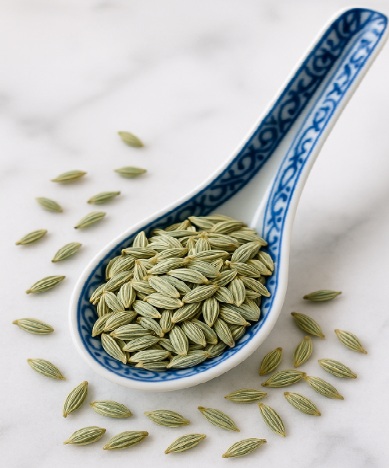Fennel Seeds Chinese Herb

Fennel Seeds (Xiao Hui Xiang): A Warming Herb for Digestion, Qi Flow, and Abdominal Comfort
Introduction
Fennel seeds, known as Xiao Hui Xiang (小茴香) in Traditional Chinese Medicine (TCM), are a fragrant, warming herb traditionally used to regulate qi, warm the interior, and alleviate abdominal pain. Their sweet and slightly pungent nature makes them ideal for relieving digestive discomfort, soothing menstrual cramps, and dispelling cold in the lower abdomen. Used both as a culinary spice and medicinal herb, fennel seeds bring warmth, movement, and comfort to the body.
What Are Fennel Seeds?
Xiao Hui Xiang refers to the dried seeds of Foeniculum vulgare, a hardy plant native to the Mediterranean but long integrated into Chinese herbal medicine. In TCM, fennel seeds are classified as acrid, warm, and entering the Liver, Kidney, Spleen, and Stomach meridians. Traditionally, they are used to move qi, disperse cold, relieve pain, and harmonize the Stomach. Their aromatic quality makes them a favorite in formulas for digestive complaints and cold-induced menstrual issues.
Health Benefits of Fennel Seeds
Promotes Qi Movement and Relieves Pain
Fennel seeds are often used to ease lower abdominal distension, pain, or cramping caused by qi stagnation or cold.
Warms the Interior and Dispels Cold
They are helpful in conditions where cold invades the Stomach or Lower Jiao, causing diarrhea, vomiting, or menstrual cramps.
Supports Digestion and Reduces Bloating
Fennel’s aromatic oils soothe the gastrointestinal tract, relieve bloating, and help with indigestion and gas.
Eases Menstrual Discomfort
Xiao Hui Xiang is used in formulas for cold-type menstrual pain, irregular periods, or abdominal tension.
Strengthens Yang and Enhances Fertility
By warming the Kidneys, fennel seeds support reproductive health and vitality, especially where cold is a contributing factor.
How to Use Fennel Seeds
In Herbal Decoctions or Digestive Teas
Use 3–6 grams of fennel seeds, gently crushed, and simmer with ginger or licorice for 15–20 minutes to relieve bloating and cold.
In Soups, Congee, or Culinary Dishes
Add to hearty soups, broths, or rice porridges to enhance warmth and digestion, especially during cold seasons.
In Topical Poultices for Abdominal Pain
Ground fennel seeds can be mixed with warm water or oil and applied externally to relieve cold-induced abdominal cramps.
Where to Buy Fennel Seeds
You can find Xiao Hui Xiang at the following places:
-
Chinese herbal medicine shops
-
Grocery stores (spice sections or Asian food aisles)
-
Online retailers such as Amazon, iHerb, or herbal specialty stores
Look for:
-
Fresh, aromatic greenish-brown seeds
-
Organic or pesticide-free certification
-
Whole seeds for better preservation of essential oils
Are There Any Side Effects?
Fennel seeds are generally very safe when used in appropriate amounts. Large quantities may cause dryness or overheating in individuals prone to yin deficiency. They should be used with caution during pregnancy, especially in high doses. Rare allergic reactions have been reported in sensitive individuals.
Conclusion
Fennel seeds, or Xiao Hui Xiang, are a warming, aromatic herb in TCM that promotes qi flow, warms the interior, and soothes digestive and menstrual discomfort. Whether brewed into a gentle tea or added to hearty dishes, fennel seeds offer an easy and effective way to bring comfort and balance to the body.
FAQs
Can I drink fennel seed tea every day?
Yes, small daily amounts are safe, especially for promoting digestion and reducing bloating.
What do fennel seeds taste like?
They have a sweet, slightly licorice-like flavor with a warm, aromatic aftertaste.
Are fennel seeds safe for children?
Yes, in small doses, fennel tea can help relieve gas, indigestion, or mild abdominal pain in children.

